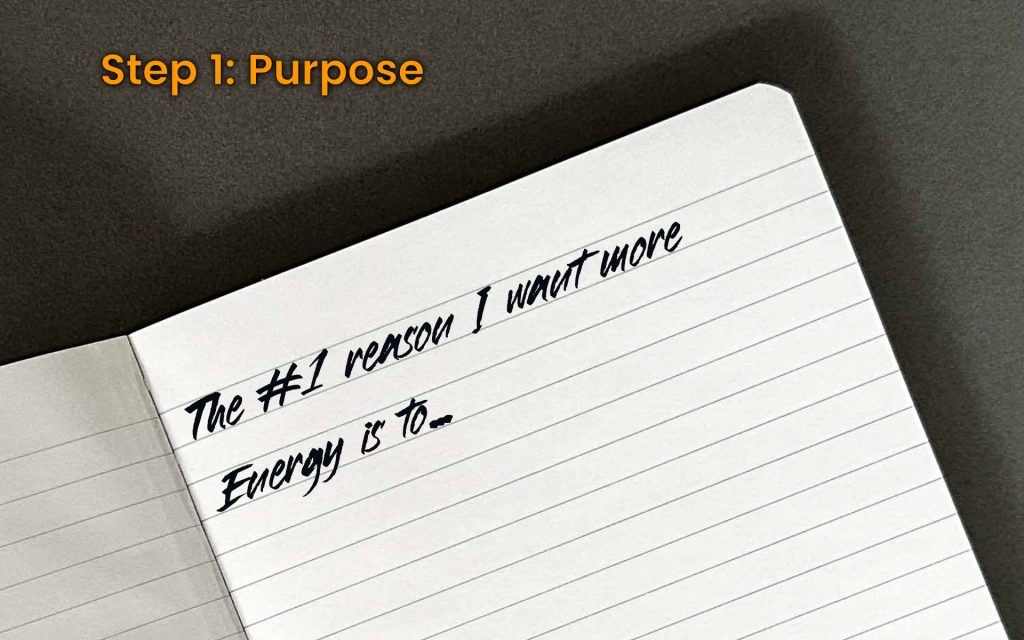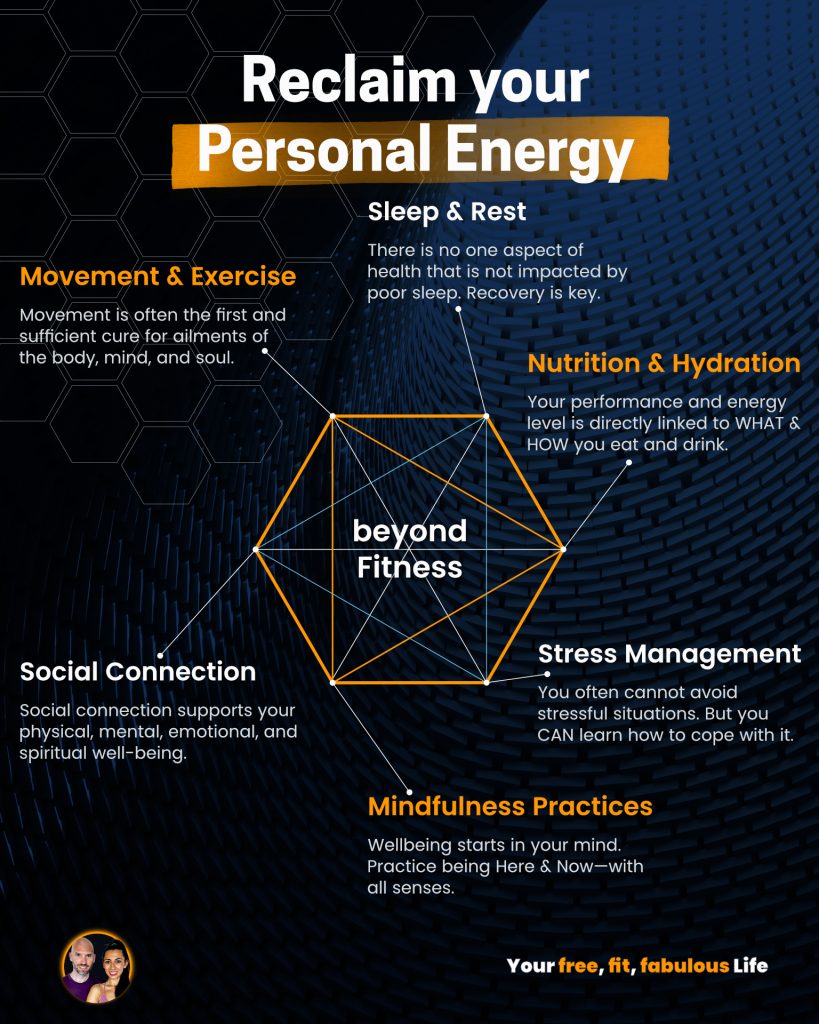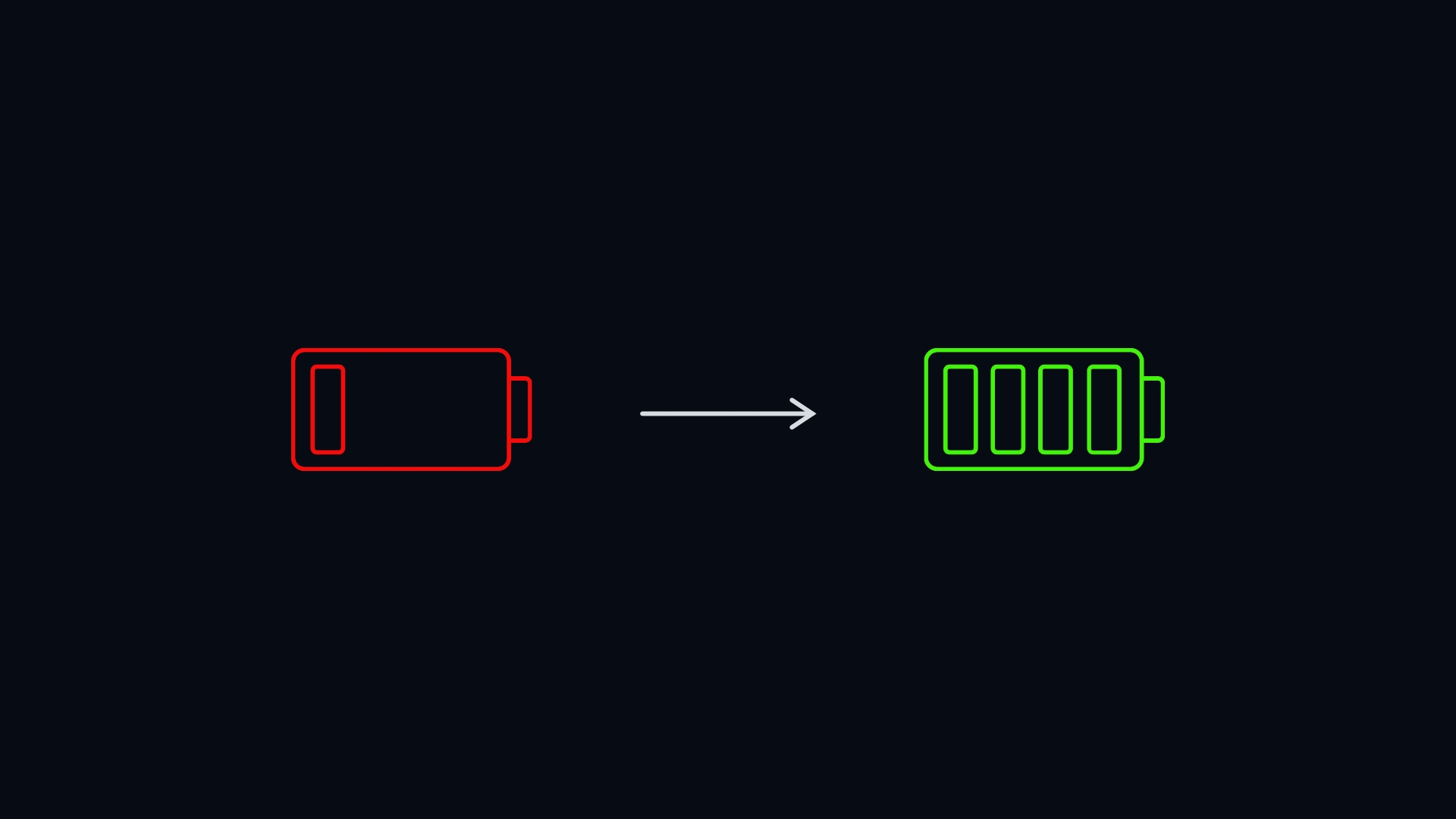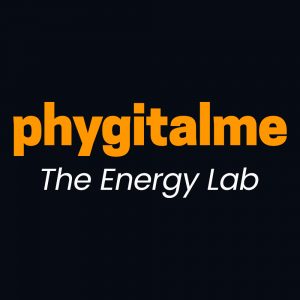As former project and sales managers, we’ve learned to schedule and organize tasks with fully packed calendars (aka time management).
And yet we often felt drained and empty needing the weekend to recover. We were left unfulfilled and questioning if this is all there is.
We got so caught up in juggling all the tasks of business and daily life that “busyness” became the reaction to this state of low energy. Only heading faster in the wrong direction was not the solution.
We needed to stop procrastinating our life—starting with the root cause: our personal energy management. Sound familiar?
Energy is life
Our personal energy has a domino effect on every thought, action, and decision we make.
Managing personal energy is the most underrated way to accelerate fitness, health, and personal growth. And eventually, design your dream life.
Taking control of our energy has been a game changer. It has enabled us to build phygitalme while being full-time managers and fitness coaches. And guess what?
We even have more energy to enjoy our relationship and do the things we love.
“The higher your energy level, the more efficient your body. The more efficient your body, the better you feel and the more you will use your talent to produce outstanding results.”
—Tony Robbins
In this actionable guide learn how to reap life’s most precious resource: your own energy.
Health Disclaimer: This guide is based on our experience (n = 2). Seek the advice of a medical professional before undergoing a new healthcare regimen.
In This Guide
What is Personal Energy Management?
Personal energy management means intentionally designing your life for freedom and self-growth—instead of wasting energy. At phygitalme, we work with a holistic approach to energy management. Here, we teach how to align your human system to have more energy—not less.
By the human system, we refer to the physical, mental, emotional, and spiritual resources of the body, mind, heart, and soul. All four aspects add up to ONE—You. Those subsystems are interconnected and influence each other.
The compound effect is a strategy of reaping huge rewards from small, seemingly insignificant actions. Meaning if you work on all 4 subsystems you create exponential energy over time.
Not only will you enhance your performance and overall well-being, but you will also achieve personal and professional goals faster.
Think back to a time when you felt energy pulsating through your body, so concentrated that you didn’t notice the world around you. You felt at ease and joy radiated from every pore. You were one with everything—fully emerged in the present moment.
So, what is personal energy management?
"Personal energy management refers to the practice of optimizing one's physical, mental, emotional, and spiritual energy levels through various techniques, such as exercise, nutrition, mindfulness, and stress reduction.
The goal is to maintain a healthy balance of energy to improve overall well-being and productivity for creating your dream life."—Ketty & Markus

Before telling you how to start mastering personal energy today, let’s look at the four main aspects of personal energy.
The Personal Energy Framework
We use mental energy to think, feel, and interact with our surroundings. Mental energy is required for a wide range of activities, from daily tasks to long-term goals. It enables us to make decisions, learn, and solve problems.
It assists us in remaining focused, motivated, and productive. It also allows us to think creatively and be resilient in times of stress. The quality of energy is as important as the quantity.
It’s challenging to succeed and keep up relationships when one’s mental energy is insufficient.
Our emotions, both positive and negative, generate emotional energy, which impact our personal energy levels. It is also influenced by the people and environments in our immediate surroundings—our ecosystem.
We can benefit from all kinds of emotions by channeling them into productive activities. Managing our emotional energy is essential for leading a healthy, balanced life. So we must be aware of our emotions and take care of ourselves.
It is critical to acknowledge all feelings and identify the sources of negative feeling patterns.
Spiritual energy, also known as prana, chi, or qi, is considered to be the source of all life. It is believed to be the driving force behind all physical, mental, and emotional activity, as well as the source of all power, creativity, and good fortune.
It is essential for health and well-being by opening one up to the power of the Universe. A greater sense of peace, joy, and love can be experienced by clearing and balancing it.
We also see it as a return to our true nature and a deep connection between ourselves, others, and mother nature.
Now let’s bring those four aspects of personal energy into context.
Basic Principles of Personal Energy Management
What if I told you there are three guiding principles that can help you master your energy levels?
These principles are not magic or faith-driven, but rather down-to-earth and pragmatic. They will guide your quest for increased energy levels.
The core principles of energy management are:
- Become the Source
- The Influence Terroir
- Surfer’s alignment and balance
Principle #1: Become the Source
You can’t give what you don’t have. You give away your energy the whole day: to your spouse, your family, colleagues, and others. Accordingly, we want to ensure to have the batteries full and not only running at 30%.
Deliberate self-care is like being plugged into a solar panel with the sun shining 24/7.
How do you do that?
Start taking care of yourself by creating habits that will positively impact your energy level.
For example, we start our day with a glass of hot lemon water with honey to rehydrate. After that, we exercise (ideally outdoors) to get the heart rate and dopamine level up—and set the tone for the day.

Principle #3: Be active and mindful like a Surfer
The Surfer Principle is about being active and mindful. Surfers are constantly active in the line-up, waiting for the next wave. This principle encourages attentiveness and focusing on the waves of life, so we can be ready to take the right move at the right time.
Aligning all subsystems (body, mind, heart, and spirit) with the wave (ecosystem, relationships, work, etc.) allows us to have the ride of our life.
Maintaining balance is key once you catch the perfect wave.
We cannot predict when a wave will come.
But we can make decisions on how to ride it.
The Surfer Principles are closely linked to our purpose in life. When our actions align with our purpose, we can harness that energy and momentum to create our own waves and positive ripple effects.
Now that you’ve learned the framework and our three main principles to boost personal energy levels, it’s time to put them to the test. In this next section, we’ll dive deeper into specific strategies and tools you can use to optimize your energy and feel your best every day.
Simple 4-step guide to feeling more energized today
Here we’ll share the direct way to have more energy right away.
1. Write down your purpose for more energy
Having a clear sense of purpose can provide direction and motivation, helping to focus your efforts and drive progress toward your goals.
It can also provide meaning and fulfillment, making the pursuit of your goals more rewarding and satisfying.
A strong sense of purpose can help you overcome obstacles and stay focused—even in the face of challenges or setbacks.
In short, having a purpose can help you achieve greater success and lead a more fulfilling life.
We are not alone in that way of thinking as this famous man clearly shows:
“He who has a why to live for can bear almost any how.”
―Friedrich Nietzsche
But what does that mean specifically?
You want to dig deep here and write down the #1 reason (at this moment) you want more energy.

Why is this important?
There will come a time when you “just don’t feel like it” or you “don’t have time to cook a healthy meal today”. It might even happen on the second day already.
We need to commit to a compelling “why” that works like a magnet and drags us toward that upgraded version of ourselves.
Here are some of our favorite examples of compelling “whys” to have more energy:
- To have more energy (and a better mood) when spending time with your spouse, kids, or friends.
- To peak performance in building your own business or leading your company at the forefront every single day (without burning out after 6 months).
- To go on adventures and live a highly pulsing lifestyle doing the stuff you truly love (e.g. hiking, diving, exploring the wonders of the world).
There was a time (a couple of years ago) when we were so winded up in the rat race that we hardly lived a fulfilling life. And we certainly didn’t have the energy and capacity to escape it. Now we use food, movement, and mindfulness as a power plant.
2. Make a personal energy audit
You can’t change what you’re not aware of. So knowing yourself will have a big impact on your personal energy level. A ruthless energy audit will get you there.
Everything that doesn’t support your energy regularly drains it and you’ll find yourself exhausted (and probably don’t know why).
That’s why it’s critical to know your “energy thieves” that steal your vital life force. Take a moment to reflect and list all your energy thieves. Here are six categories to help you reflect:
- Nutrition & Hydration (highly processed food, sugar, alcohol)
- Movement & Exercise (lack of strength, flexibility, mobility, physical pain, tension)
- Mindfulness (negative self-talk, limiting beliefs, rehearsing the past, living in the future)
- Sleep & Rest (time and quality of daily rest & recovery)
- Social Connection (personal ecosystem with family, friends, spouse, colleagues, etc.)
- Stress Management (management of work and private life)
(come back later since this exercise takes roughly 20-40 minutes)

Let’s make this more specific with a practical example your can start with:
When it comes to physical energy, nutrition has a direct impact.5,6,7 While there are biological and psychological connections between the two, here, we want to focus on one aspect: mindless eating.
Mindless eating—both in terms of what we eat and how we eat—can quickly drain our energy. Unconscious food choices have short-term & long-term health & energy consequences.
Food and drinks affect our insulin level, and therefore our personal energy level. When we eat mindlessly, we tend to eat faster, more, and with increased stress.
Here’s a simple framework for your mindless eating audit:
- Log in every food you eat and every drink you have throughout the day (yup even that tiny cookie you eat with your after-lunch coffee)
- Watch your body after each meal (how do you feel after 10, 30, and 60 min. after your meal—do you notice an energy drop?)
- Note down with + and – if you sensed an increase or drop in energy and the time frame when it occurred
- Do this for 3 days straight
3. Develop skills for optimal energy
A skill is a learned ability to perform a specific task. It is a competency that is acquired and developed through education, practice, training, and experience.
For instance, developing the skill to train your body to lift heavy, move with ease, and become pain-free. Strength is an attribute AND skill that can be developed by following the right principles and best methods. We even developed it further so that we can train anywhere and anytime.
One of the best skills to develop is mindfulness. It is an essential skill for personal energy management, self-growth, and self-actualization.
4. Boost your energy right away
Let’s get to some practical tips on how you can boost your energy today.
For the key aspects driving your physical, mental, and emotional energy, we’ll provide you some actionable tips you can start working on today (or at least take the first actions toward your most energetic and thriving self).
Remember Principle #1: Become the Source?
The key to becoming your own source of energy is to learn how to optimize and manage your energy levels through a combination of mindful practices, regular physical activity, and mindful nutrition.
Here are some tips to get you started:
- Estimate Your Energy Levels:
It is important to be aware of how your energy levels are changing throughout the day. A simple way to do this is to take a few moments each day to take note of how you are feeling and rate your energy levels on a scale from 1-10 (remember the Energy Audit from above?). - Identify Stressors:
Stress can be a major energy drain.8,9 It is important to identify what is causing you stress, and then come up with strategies for reducing it. (For the quick win: take 10 deliberate deep and slow breaths—in through your nose, out through your nose). - Prioritize Sleep:
Getting plenty of restful sleep is essential for restoring and maintaining your energy levels. Aim for 7-9 hours of quality sleep each night. - Focus on Mindful Practices: Mindfulness can help boost your energy by increasing self-awareness, consciousness, and focus.
- Incorporate Movement:
Exercise increases mitochondria in muscle cells, boosts oxygen flow in the body, enhances neuro-modulator levels, and promotes healthier nighttime sleep. (Quick win: make 5 push-ups, 5 rows, 5 pull-ups, 5 dips, and 5 squats right out of bed—we promise you’ll be awake right away). - Eat Mindfully:
Eating mindfully means making conscious choices in your food selection. This will help to reduce stress and increase energy levels. The more experience on what and how to eat you gather, the better you can “automate” (and enjoy) nurturing your body with food.10 - Practice Active Rest:
Active rest activities, such as stretching, self-massage, and foam-rolling, can help to increase blood flow to muscles and reduce stress.
Managing your personal energy is not just important for leading a healthy and balanced life, it’s essential! Your personal energy levels have a huge impact on every aspect of your life.
By understanding the four aspects of personal energy and implementing the three principles of personal energy management, you can optimize your energy levels and feel your best every day.
Remember, energy is life, and taking control of it can be a game-changer. So, start using the tips and strategies outlined in this guide and optimizing your energy today while unlocking your full potential. You won’t regret it!
If you…
- often feel sluggish and would love to feel energized most of the time
- are looking for a way to boost your energy in a sustainable way
- are easily getting winded and want to be fit and thriving
AND you ultimately want to merge optimal performance & well-being then head over to our FREE “Fit Check”.
Recommended Books on Energy Management
- Limitless by Jim Quik
- Why We Sleep by Matthew Walker
- The Emotional Energy Factor by Mira Kirshenbaum
- The Oxygen Advantage by Patrick McKeown
- Sacred Rest by Dr. Saundra Dalton-Smith
- The Headspace Guide to… Mindful Eating by Andy Puddicombe
- Overcoming Gravity by Steven Low
P.S. If you enjoyed this free guide, please share it with others.
- Share the guide on Twitter, LinkedIn, or Facebook.
- Or, copy and paste the link: https://www.phygitalme.com/personal-energy-management-101
Thank you!
- Human Bio-field and Psychical Sensitivity by Zahran SK (2019), J Psychol Psychiatry Stud Vol: 1, Issu: 1 (36-38)
- Does exercise really boost energy levels? by Toni Golen, MD & Hope Ricciotti, MD, Harvard Health Publishing
- Ecosystems and human well-being : health synthesis : a report of the Millennium Ecosystem Assessment by Carlos Corvalan, Simon Hales, Anthony McMichael [et al.], WHO Library Cataloguing-in-Publication Data
- Butler, C.D., Corvalan, C.F. & Koren, H.S. Human Health, Well-Being, and Global Ecological Scenarios.Ecosystems 8, 153–162 (2005)
- Which foods help stabilize insulin and blood sugar? in Medical News Today
- Bo S, Fadda M, Fedele D, Pellegrini M, Ghigo E, Pellegrini N. A Critical Review on the Role of Food and Nutrition in the Energy Balance. Nutrients. 2020 Apr 22;12(4):1161. doi: 10.3390/nu12041161. PMID: 32331288; PMCID: PMC7231187.
- In-Depth Review: Nutrition and Health Part 1: Macronutrients and Overnutrition by Elena Isabel Nunez
- American Psychological Association. (2022, October 31). How stress affects your health.
- Schneiderman N, Ironson G, Siegel SD. Stress and health: psychological, behavioral, and biological determinants. Annu Rev Clin Psychol. 2005;1:607-28. doi: 10.1146/annurev.clinpsy.1.102803.144141. PMID: 17716101; PMCID: PMC2568977.
- Tapper K. Mindful eating: what we know so far. Nutr Bull. 2022 Jun;47(2):168-185. doi: 10.1111/nbu.12559. Epub 2022 May 10. PMID: 36045097.




